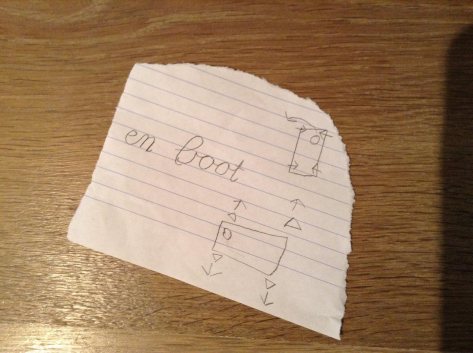When Una was about the age that Nestor is now, like any first time parents we were naturally marveling at every new word she learnt and every new sentence construction she would put together. An additional dimension of hilariousness was that she would use all three languages at the same time, very often in one sentence (this blog’s address is one of Una’s first sentences, met-the-ovo – meaning with-the-this (dutch/english/serbian)). But sadly, other than a few very memorable ones, we forgot a lot of these early gems, and also I honestly have no idea how big her vocabulary was when she was 18/22/24 months old. So I am going to do the opposite of what my parents (read: my father) did and try to record my youngest child’s verbal development. While my father lovingly and meticulously kept/marked/framed/gold plated my sister’s doodles from 1-10 years in half a day increments, the only thing I have from my early childhood other than a photo here and there (in most of which they couldn’t have been bothered to wipe my beloved jam off my face) is that one tape of me singing yelling at them. They later tried making up for that with the cheesy stories of how I made our family complete, was an angel baby and could read at the age of 4. Of course I was too smart to buy into any of it, I could read at the age of 4 for goodness sake. I hope you now understand why I have a soft spot for younger siblings.
Anyway, I thought I would write down some words and sentences that Nestor now uses on a daily base. And while Una at this age spoke mostly in Serbian, then in Dutch and only then in English Nestor seems to be a lot more balanced. So at 20 months old some things he says:
Serbian:
Ne tamo (not there, I use that a lot with him)
Moja zaba (my frog)
Ide kozice (going to the goats)
Gde je, gde je? (where is, where is)
Oko/glava/nos/uvo (eye/head/nose/ear)
Pazi! (look out, careful)
Pada kisa, mokro (it is raining and wet)
Nije nase auto (it is not our car – followed by a sigh if it is a car fancier than ours which is, well, most cars)
Sokoooo (Juuuuuiceeeee)
Sam! (Alone, by myself!)
Njam njam (yum, yum)
baka/deka/te(t)ka/Jana – granma/granpa/aunty/Jana
slon/maca/krava/patka/mis (elephant/cat/cow/duck/mouse or Smurph)
JOS! (More!)
B(r)avo!
Veeeliko more (biiig sea)
Puuuno auta (lots of cars)
Avion/kamion (airplane/truck)
Kaki (#2)
Pupa (belly button)
Kasika (spoon)
Mama nos(i) (Mama, carry me)
Ca(ra)pe – socks, this kid is obsessed with socks, every morning when we dress him he is very concrete on which pair he wants for the day, the rest he doesn’t care too much about but socks he is serious about
Pec-pec (hot-hot)
Fuji (yuck)
English:
Is a good boy (mostly when he is not:))
Give me dummy
Look!
Whyyyyyy?
Enough Una! (he uses this a lot)
Kiss, kiss!
Come seka (seka means “a little sister” in Serbian which is how he mostly calls Una)
Horsey, horsey
Cookieeeeeeeeeeeeee!
Give hand
There you gooooooo
Money, money, funny (can you tell that we are Mama Mia fans?)
Good morning (sounds more like “good moaning” though)
Thank you. (he say is every.time.you give him something. And it is still adorable)
P(l)ease. (hmm, looks like he is learning his manners from Daddy and learning to give orders from mama…)
Chippy
Fishy/cat/ducky/horsey/birdie
Hot (more pronounced like hooooooot)
C(l)ean, c(l)ean
Dutch:
Ik wil (I want to – this he uses with all three languages, so he will say “Ik wil tamo” for “I want to go there”)
Ik wil slapen/drinken/eten – I want to sleep/drink/eat
Zitten bum – this comes from the phase where he thought that chairs are for standing on them and subsequently falling off, so Mark lost his voice repeating “sit on your bum” which became “zitten bum” and this is what he uses every time he sees anything that can be sat on.
Van mij! (Mine! – this is the first Dutch word that Una learnt as well, day care survival)
Pindakaas (peanut butter)
Appel (apple)
Is weg (it is gone)
Mama werken (mama is at work)
Ball (ball, but pronounced differently)
Lopen (walk)
I am sure this is not all, he is a real chatterbox these days, although his most effective way of communication by far has recently been the lovely screech that mostly gets him what he wants VERY fast. Will try to add new ones every month or so, it should be interesting (for Mark and I only, of course) to follow how it develops and I am sure there will be many “met-the-ovo”s of his own to come!

